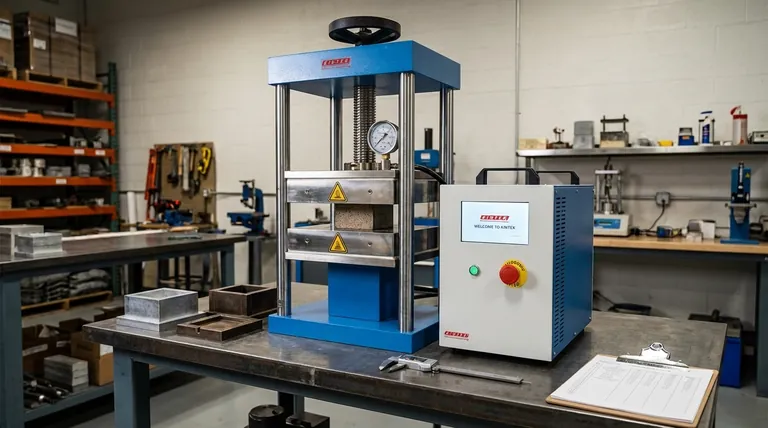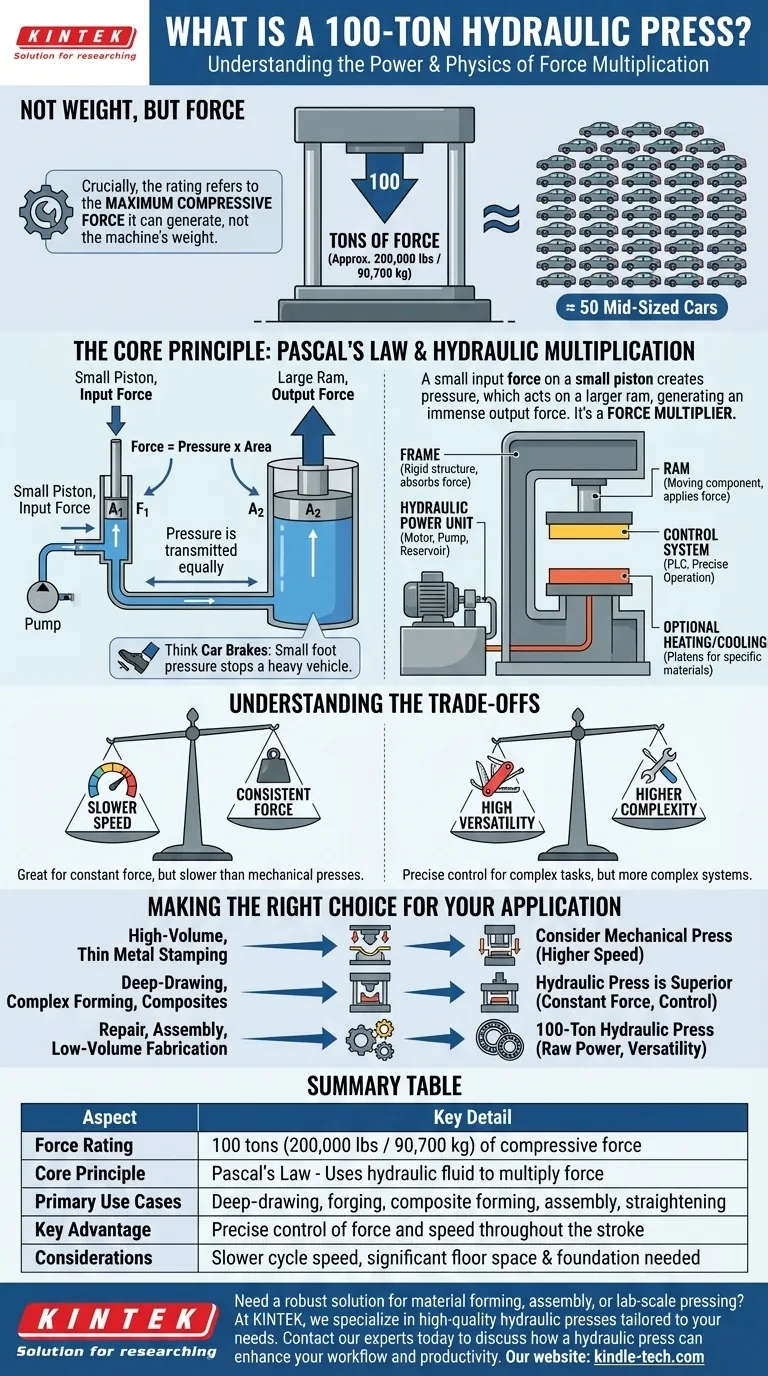Crucially, a 100-ton hydraulic press is not a machine that weighs 100 tons. The "100-ton" rating refers to the maximum compressive force it can generate. This machine uses the principle of hydraulic multiplication to convert a relatively small input force into an immense output force equivalent to the weight of approximately 50 mid-sized cars.
The core concept to grasp is that a hydraulic press is a force multiplier. It leverages an incompressible fluid, governed by Pascal's Law, to transform low-pressure effort into high-tonnage force for tasks like shaping, bending, and compressing industrial materials.

The Core Principle: How It Generates Force
To understand a 100-ton press, you must first understand the physics that make it possible. The entire machine is an application of a fundamental law of fluid mechanics.
Pascal's Law in Action
A hydraulic press operates on Pascal's Law. This principle states that when pressure is applied to a confined fluid (like hydraulic oil), that pressure is transmitted equally and undiminished to all parts of the fluid and the walls of its container.
Think of the brake system in your car. A light push on the brake pedal with your foot generates enough force to stop a two-ton vehicle because the brake fluid transmits and multiplies that force to the brake pads at the wheels. A hydraulic press uses the same principle on a much larger scale.
From Small Piston to Large Ram
The system uses two connected pistons of different sizes. A pump applies pressure to hydraulic fluid, which acts on a small-diameter piston. This pressure is then transmitted through the fluid to a much larger-diameter piston, which is the machine's ram.
Because the force is the pressure multiplied by the area (Force = Pressure x Area), the same pressure acting on a larger area generates a proportionally larger force. This is how the press achieves force multiplication, turning a manageable hydraulic pressure into 100 tons of output.
What "100 Tons of Force" Means
This rating signifies the machine's capacity to exert a downward force of 100 tons (or approximately 200,000 pounds / 90,700 kilograms). This immense, controllable force is what allows the press to perform work like forging hot billets of steel, deep-drawing sheet metal into complex parts, or pressing large industrial components together.
Key Components of a 100-Ton Press
While designs vary, most industrial hydraulic presses share a common set of core components that work together to safely deliver and withstand this force.
The Frame and Ram
The frame is the rigid, heavy structure that houses all components and absorbs the immense opposing force generated during operation. The ram is the moving component, driven by the main hydraulic cylinder, that makes contact with the workpiece.
The Hydraulic Power Unit
This is the heart of the press. It includes an electric motor, a hydraulic pump to create fluid pressure, a reservoir for the hydraulic oil, and a network of valves and hoses to control the fluid's flow, direction, and pressure.
The Control System
Modern presses use sophisticated control panels, often with PLCs (Programmable Logic Controllers). These systems allow an operator to precisely manage the ram's speed, stroke length, and the amount of force applied, ensuring repeatability and safety.
Optional Features: Heating and Cooling
Some hydraulic presses, known as hot presses, incorporate heating platens. These systems use electric heating elements or circulating thermal oil to heat the workpiece, making it more malleable for forming operations. This is common in composites and woodworking industries.
Understanding the Trade-offs
A 100-ton hydraulic press is a powerful tool, but it's not the right choice for every application. Understanding its inherent trade-offs is key to using it effectively.
Speed vs. Force
Hydraulic presses excel at providing consistent force throughout the entire stroke of the ram. However, they are generally slower than their mechanical press counterparts, which are often preferred for high-speed, high-volume stamping operations.
Versatility vs. Simplicity
The precise control over speed and pressure makes hydraulic presses extremely versatile for a wide range of tasks, including deep drawing, forming unique geometries, and assembly. This versatility can come with added complexity in the control and hydraulic systems.
Footprint and Infrastructure
A press capable of generating 100 tons of force is a substantial piece of industrial equipment. It requires significant floor space, a reinforced concrete foundation to handle its weight and operational forces, and a high-capacity electrical supply for the motor.
Making the Right Choice for Your Application
Selecting the right press depends entirely on the material you are working with and the specific task you need to accomplish.
- If your primary focus is high-volume, repetitive stamping of thin metal: A mechanical press may be a better fit due to its higher cycling speed.
- If your primary focus is deep-drawing, complex forming, or working with composites: The hydraulic press is superior due to its constant force and precise control throughout the stroke.
- If your primary focus is workshop repair, assembly, or low-volume fabrication: A 100-ton hydraulic press provides the raw power needed for pressing bearings, straightening heavy shafts, and general forming tasks.
Ultimately, understanding that the "100-ton" rating refers to controllable power is the first step toward leveraging this machine's true capability.
Summary Table:
| Aspect | Key Detail |
|---|---|
| Force Rating | 100 tons (200,000 lbs / 90,700 kg) of compressive force |
| Core Principle | Pascal's Law - Uses hydraulic fluid to multiply force |
| Primary Use Cases | Deep-drawing, forging, composite forming, assembly, straightening |
| Key Advantage | Precise control of force and speed throughout the stroke |
| Considerations | Slower cycle speed than mechanical presses; requires significant floor space and foundation |
Need a robust solution for material forming, assembly, or lab-scale pressing?
At KINTEK, we specialize in providing high-quality lab equipment, including hydraulic presses tailored to your specific industrial and research needs. Whether you're working with composites, metals, or other materials, our expertise ensures you get the right equipment for precise control and reliable performance.
Contact our experts today to discuss how a hydraulic press can enhance your workflow and productivity.
Visual Guide

Related Products
- Laboratory Hydraulic Press Split Electric Lab Pellet Press
- Laboratory Hydraulic Press Lab Pellet Press Machine for Glove Box
- Manual High Temperature Heated Hydraulic Press Machine with Heated Plates for Lab
- Automatic High Temperature Heated Hydraulic Press Machine with Heated Plates for Lab
- Heated Hydraulic Press Machine with Heated Plates for Vacuum Box Laboratory Hot Press
People Also Ask
- What role does a laboratory hydraulic press play in the preparation of solid electrolyte pellets? Ensure Data Accuracy
- Why are KBr pellets used in FTIR? Achieve Clear, Accurate Solid Sample Analysis
- What is the use of KBr? Master Sample Prep for Accurate IR Spectroscopy
- What is the advantage of KBr? Unmatched IR Transparency for Precise Spectroscopy
- How does a laboratory hydraulic press improve XRF accuracy for catalyst samples? Enhance Precision & Signal Stability



















